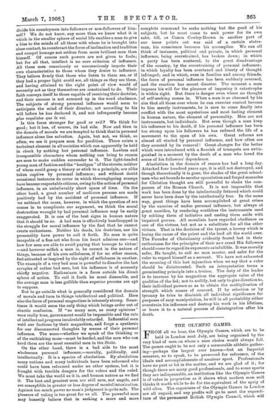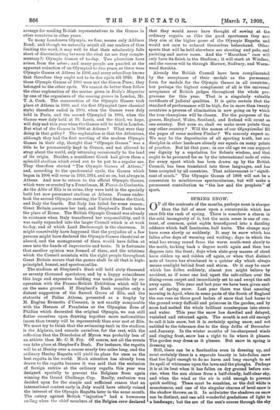THE OLYMPIC GAMES.
FROM all we hear, the Olympic Games, which are to be held in London next July, are being organised by the very kind of men on whom a sane choice would always fall. The games ought to be not only a memorable athletic gather- ing—perhaps the largest ever known—but an Imperial measure, so to speak, to be preserved for reference, of the ideals and accomplishments of amateur sport. Professionals have no part or lot in the matter, and we are glad of it ; for though there are many good professionals, and to some sports they are indispensable, an institution like the Olympic Games is of value in proportion as it shows what modern man still thinks it worth while to do for the equivalent of the sprig of wild olive. The organisers of the Olympic Games in London are all unpaid, and any profits will go to meet the expendi- ture of the permanent British Olympic Council, which will
arrange for sending British representatives to the Games in other countries in other years.
To many Londoners Olympia, we fear, means only Addison Road; and though we naturally acquit all our readers of thus limiting the word, it may well be that their scholarship falls short of discriminating between the rival (or are they comple- mentary F) Olympic Games of to-day. Two phoenixes have arisen from the ashes ; and many people are puzzled at the apparent reduction of an Olympiad to two years, as there were Olympic Games at Athens in 1906, and every schoolboy knows that therefore they ought not to be due again till 1910. But those Olympic Games of 1906 were not the Simon Pure ; they belonged to the other cycle. We cannot do better than follow the clear explanation of the matter given in Baily's Magazine by one of the organisers of the coming games in London, Mr. T. A. Cook. The resurrection of the Olympic Games took place at Athens in 1896, and the first Olympiad (new classical style) therefore ended in 1900, when the Games were duly held in Paris, and the second Olympiad in 1904, when the Games were duly held at St. Louis, and the third, we hope, will duly end this year when the Games will be held in London. But what of the Games in 1906 at Athens ? What were they doing in that galley ? The explanation is that the Athenians, although they had the first meeting of the modern Olympic Games in their city, thought that "Olympic Games" was a title to be permanently kept in Greece, and not allowed to stray about the world, only returning occasionally to the land of its origin. Besides, a munificent Greek had given them a splendid stadium which cried out to be put to a regular use. They therefore started " The Olympic Games of Athens," and, according to the quadrennial cycle, the Games which began in 1906 will recur in 1910,1914, and so on, but always in Athens. And now to return to the official Olympic Games, which were re-created by a Frenchman, M. Pierre de Coubertin. As the Altis of Elis is in ruins, they were held in the specially built but now permanent stadium at Athens. France under- took the second Olympic meeting, the United States the third, and Italy the fourth. But Italy has failed for some reason ; Great Britain assumes her task, and Shepherd's Bush takes the place of Rome. The British Olympic Council was already in existence when Italy transferred her responsibility, and it was easily expanded into the larger Council which is at work to-day, and of which Lord Desborough is the chairman. It might conceivably have happened that the prejudice of a few persons might have declared the Olympic Games theatrical or absurd, and the management of them would have fallen at once into the hands of impresarios and touts. It is fortunate that another opinion was formed of them, and the relations which the Council maintain with the right people throughout Great Britain secure that the games shall be all that is high- principled, honest, and sportsmanlike.
The stadium at Shepherd's Bush will hold sixty thousand or seventy thousand spectators, and by a happy coincidence this huge and expensive building was made possible by co- operation with the Franco-British Exhibition which will be on the same ground. If Shepherd's Bush supplies only a distant suggestion of the Sacred Grove of Elis, and the statuette of Pallas Athene, presented as a trophy by M. Eugene Brunetta d'Usseaux, is not exactly comparable with the Hermes of Praxiteles or the Olympian Zeus of Phidias which decorated the original Olympia, we can still flatter ourselves upon drawing together more nationalities (more than twenty will be represented) than ever met at Ells. We must try to think that the swimming-tank in the stadium is the Alpheus, and console ourselves, for the rest, with the reflection that the Discobolos of Myron was probably less of an athlete than Mr. C. B. Fry. Of course, not all the events can take place at Shepherd's Bush. For instance, the regatta will be at Henley over a course nearly two miles long, and the ordinary Henley Regatta will yield its place for once as the best regatta in the world. Much attention has already been drawn to the regatta because it was said that the exclusion of foreign entries at the ordinary regatta this year was designed specially to prevent the Belgians from again winning the Grand Challenge Cup. Really, exclusion was decided upon for the simple and sufficient reason that an international contest early in July would have utterly ruined the interest of the Olympic Regatta later in the same month.
The outcry against British "injustice" had a humorous ending when the chief members of the Belgian crew declared that they would never have thought of rowing at the ordinary regatta as (like the good sportsmen they are) they aim at the higher game of the Olympic Regatta and would not care to exhaust themselves beforehand. Other sports that will be held elsewhere are shooting and polo, and yachting and motor races. And the " Marathon " race will only have its finish in the Stadium ; it will start at Windsor, and the course will be through Harrow, Sudbury, and Worm- wood Scrubba.
Already the British Council have been complimented by the acceptance of their medals as the permanent form for medals for the Olympic Games in all countries ; but perhaps the highest compliment of all is the universal acceptance of British judges throughout the whole pro. gramme for this year. That is a singularly valuable certificate of judicial qualities. It is quite certain that the standard of performance will be high, for in more than twenty countries a process of elimination in now going on by which the true champions will be chosen. For the purposes of the games, England, Wales, Scotland, and Ireland will count as one country. But even so, shall we make more points than any other country ? Will the names of our Olympionikoi fill the pages of some modern Pindar ? We scarcely expect so. We may be the depositaries of all sporting truth, but our disciples in other lands are already our equals on many points of practice. But let that pass ; in our old age we can support our dignity by a reputation for Solonic wisdom, and that ought to be procured for us by the international code of rules for every sport which has been drawn up by the British Council, has been translated into three languages, and has been accepted by all countries. That achievement is " signifi- cant of much." The Olympic Games of 1908 will not be a concession to mischievous spectacularism, but will make a permanent contribution to "the law and the prophets" of sport.















































 Previous page
Previous page